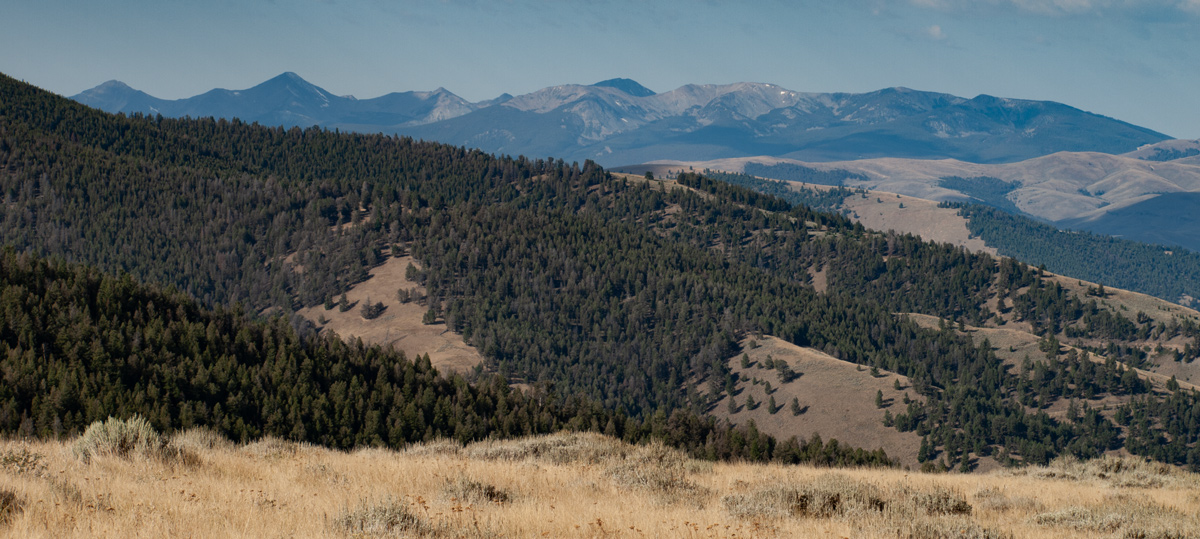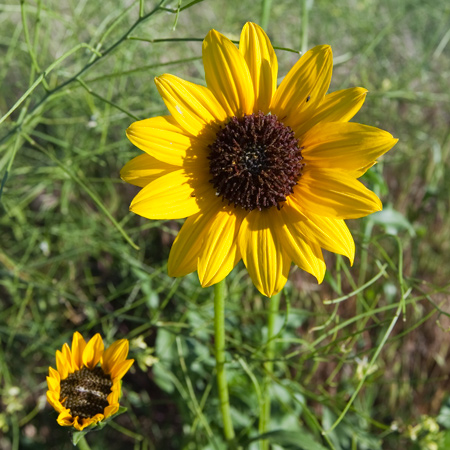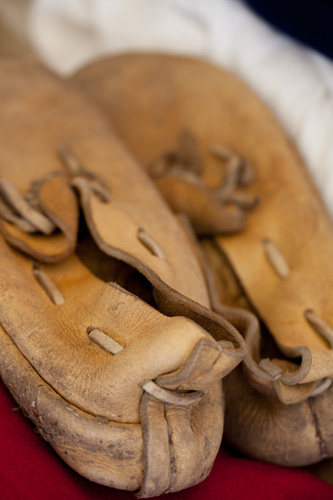With the help of the Lemhi Shoshones, Lewis has the last of the baggage carried over Lemhi Pass. At Cameawait‘s village, he adds to his worries when he receives Clark‘s letter with bad news about crossing the Bitterroot Mountains. He has the men dance for the amusement of the villagers, and this will be his last journal entry for the year.
Clark and his small group move up the Lemhi River camping at a small village where they can obtain some fish. He directs his men to mend their moccasins and be ready to hunt early in the next morning.
Birth on the Trail
by Yellowstone Public Radio[1]Originally aired weekdays by Yellowstone Public Radio during the Bicentennial observance of 2003-2006. Narrated by Hal Hansen. Scripts by Whit Hansen and Ed Jacobson. Produced by Leni Holliman. © … Continue reading
Lewis: Past the Great Divide
View from the Great Divide (Lemhi Pass)
© 9 September 2008 by Kristopher K. Townsend. Permission to use granted under the Creative Commons Attribution-Share Alike 4.0 International license.
End of the Missouri
we soon arrived at the extreem source of the Missouri; here I halted a few minutes, the men drank of the water and consoled themselves with the idea of having at length arrived at this long wished for point.
—Meriwether Lewis
A Shoshone Women Gives Birth
one of the [Lemhi Shoshone ]women who had been assisting in the transportation of the baggage halted at a little run about a mile behind us . . . . I enquired of Cameahwait the cause of her detention, and was informed by him in an unconcerned manner that she had halted to bring fourth a child and would soon overtake us; in about an hour the woman arrived with her newborn babe and passed us on her way to the camp apparently as well as she ever was.
—Meriwether Lewis
Digging Gairdner’s Yampah
I observe the indian women collecting the root of a speceis of fennel which grows in the moist grounds and feeding their poor starved children; it is really distressing to witness the situation of those poor wretches . . . . when dryed and pounded it makes a fine white meal; the flavor of this root is not unlike that of annisseed but not so pungent
—Meriwether Lewis
Common Sunflower
Helianthus annuus
Location: Decision Point, Mouth of the Marias, 28 June 2013. © by Kristopher K. Townsend. Permission to use granted under the Creative Commons Attribution-Share Alike 4.0 International license.
Nuttall’s Sunflower
The sunflower is very abundant near the watercourses the seeds of this plant are now rip and the natives collect them in considerable quantities and reduce them to meal by pounding and rubing them between smooth stones. this meal is a favorite food their manner of using it has been before mentioned.
—Meriwether Lewis
Gun Salute
Cameahwait requested that we would discharge our guns when we arrived in sight of the Village, accordingly when I arrived on an eminence above the village in the plain I drew up the party at open order in a single rank and gave them a runing fire discharging two rounds. they appeared much gratifyed with this exhibition.
—Meriwether Lewis
A Letter from Clark
I found Colter here who had just arrived with a letter from Capt. Clark in which Capt. C. had given me an account of his perigrination and the description of the river and country as before detailed . . . .
—Meriwether Lewis
Another Request for Cameahwait
I now informed Cameahwait of my intended expedition overland to the great river which lay in the plains beyond the mountains and told him that I wished to purchase 20 horses of himself and his people to convey our baggage.
—Meriwether Lewis
Clark Mends Moccasins
Plains Style Moccasins
© 2011 by Kristopher K. Townsend. Permission to use granted under the Creative Commons Attribution-Share Alike 4.0 International license.
Lost Horses
four hunters went on early ahead, and one man to look for the horses. We breakfasted on the beaver and a salmon, which had been saved from supper the preceding evening. The man, who had gone for the horses, having returned without finding them, 4 or 5 more went out, and our guide [Toby] immediately found them.
—Patrick Gass
Moving Up the Lemhi
We then about 10 o’clock, proceeded on to the forks, where we found our hunters; but they had killed nothing. So we went up to a small village of the natives, got some fish from them, and lodged there all night.
—William Clark
Mending Moccasins
I derected the men to mend their Mockessons to night and turn out in the morning early to hunt Deer fish birds &c. &c.
—William Clark
Weather Diary
State of the Thermometer at rise
Weather at rise
Wind at rise
State of the Thermometer at 4 P.M. Weather at 4 P.M. Wind at 4 P.M. 31 [above 0] fair S. E. 45 [above 0] fair S. E hard white frost and some ice on standing water this morning arrived with baggage and party on the Columbia river at 5 P. M.
—Meriwether Lewis[2]To assist the reader, the editor of this web page has omitted the date column and spelled out some abbreviations.
Lemhi Pass is a High Potential Historic Site along the Lewis and Clark National Historic Trail managed by the U.S. National Park Service. The pass is managed by the US Forest Service.
Notes
| ↑1 | Originally aired weekdays by Yellowstone Public Radio during the Bicentennial observance of 2003-2006. Narrated by Hal Hansen. Scripts by Whit Hansen and Ed Jacobson. Produced by Leni Holliman. © 2003 by Yellowstone Public Radio. |
|---|---|
| ↑2 | To assist the reader, the editor of this web page has omitted the date column and spelled out some abbreviations. |
Experience the Lewis and Clark Trail
The Lewis and Clark Trail Experience—our sister site at lewisandclark.travel—connects the world to people and places on the Lewis and Clark Trail.
Discover More
- The Lewis and Clark Expedition: Day by Day by Gary E. Moulton (University of Nebraska Press, 2018). The story in prose, 14 May 1804–23 September 1806.
- The Lewis and Clark Journals: An American Epic of Discovery (abridged) by Gary E. Moulton (University of Nebraska Press, 2003). Selected journal excerpts, 14 May 1804–23 September 1806.
- The Lewis and Clark Journals. by Gary E. Moulton (University of Nebraska Press, 1983–2001). The complete story in 13 volumes.






